We asked the BuzzFeed Community if they ever had a skincare question for a dermatologist that they were maybe too embarrassed to ask, and they provided some insightful questions. So we reached out to Dr. Cristina Psomadakis (known as "Dr. Soma" to her followers on social media), a dermatologist based in London who is also completing a master's in skin aging and aesthetics, to get the most informative answers.
1. "Is it bad if a birthmark turns into a scab?"
Dr. Soma: It totally depends; sometimes this could mean something relatively harmless, like you knocked or scratched it without realizing, or that you’ve developed a skin condition on top of the birthmark. On the other hand, if it is a changing mole, it could be a sign of something more serious. If it is something lasting more than a few weeks, a doctor should check it out and give you a diagnosis so that you know what is causing this change.
2. "I am in my mid-twenties, and I noticed there are lines that are becoming more prominent directly underneath my lower lash line. Is this part of aging, and if so, can it be fixed by derma fillers?"
Dr. Soma: Fine lines can be a sign of early wrinkles forming or of dehydrated skin. Around the mid-twenties, we start losing some of the collagen in our skin, which gives it its youthful bounce. The skin around the eyes is thin, sensitive, and we make lots of expressions with it, so it's prone to wrinkling. Before rushing into fillers or Botox, it is important to get the basics right. Make sure to have your eyes checked so you are keeping squinting to a minimum. Wear sunscreen and sunglasses to protect yourself from UV rays; that’s the number one cause of skin aging. Try to avoid rubbing the eye area, moisturize it, and treat it gently. Finally, a gentle retinol cream can help rebuild some collagen.
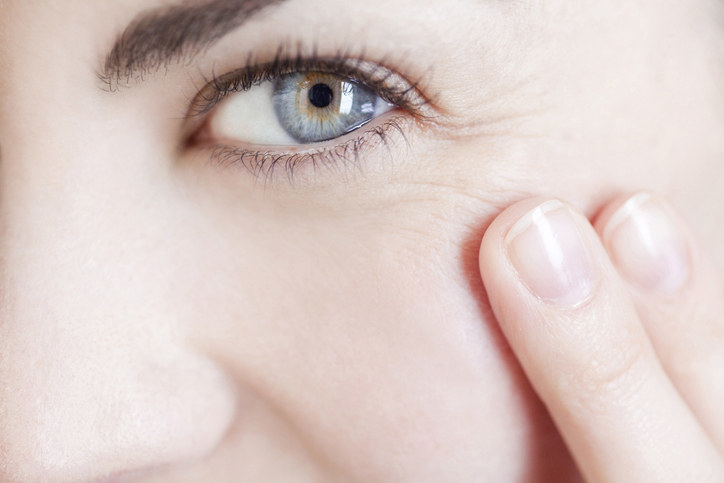
3. "I struggle with SUPER-DRIED-OUT LIPS all the time. I’ve done everything: masks, scrubs, ChapStick, hydration, plus more water in my body. It was suggested it might be an imbalance in my lip flora. What can I do to rebalance, or what can I try to FINALLY hydrate these babies?"
Dr. Soma: Chronic dried lips is a medical condition known as cheilitis. There are tons of things that could be contributing here, like over-licking as a subconscious habit, irritation or allergy from lip products or skincare products, sun exposure, or having an underlying skin condition like eczema. A lot of people are allergic to beeswax, and that is in a LOT of lip balms. If it looks really crusty, a doctor should take a swab to see what’s growing and might prescribe antibiotics. I would avoid scrubs and just use something like Vaseline in the evenings and sunscreen balms in the day. If it persists, you should definitely see a dermatologist, who can do allergy testing if needed.
4. "What is REALLY the best way to get rid of hyperpigmentation/dark spots caused by sun damage (or acne)? None of the many low- to mid-priced over-the-counter products that I've tried have lightened the spots on my face at all, so I'm curious if there is actually an effective *affordable* product out there."
Dr. Soma: The most important thing is to address the cause of hyperpigmentation in the first place. Because unless you do that, you’ll never catch up enough to see results. In your case, make sure the acne is under control and you are sun-protecting well. If you are doing this, you will be amazed to see how much things fade with time alone over the course of six months to a year. Ingredients that target hyperpigmentation include tranexamic acid, azelaic acid, vitamin C, and hydroquinone. Patience — and making sure not to irritate the skin — are key. And if that doesn’t work, combining some products with laser treatments can be helpful.
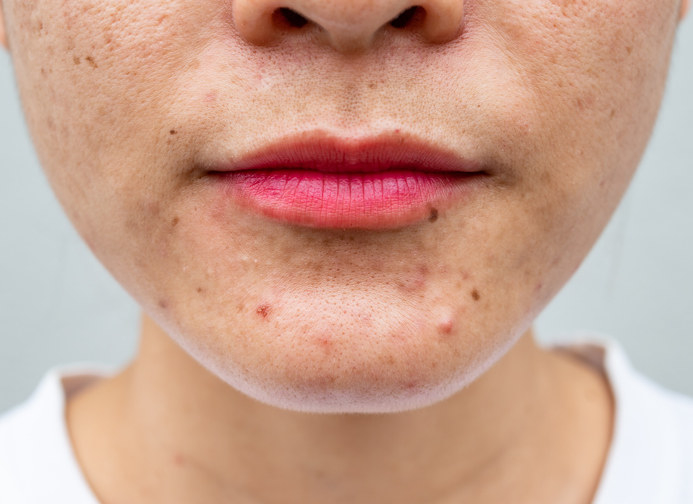
5. "I’m in my thirties and still dealing with acne. The last round of products I tried included clindamycin, Differin, and benzoyl peroxide, but they barely did anything. The only thing that’s ever actually given me clear skin was Accutane, but I’m not interested in going that route again. Are there any other options for me, or am I doomed to have zits until I’m 90?"
Dr. Soma: Unfortunately, it is a total myth that acne is experienced only by teenagers. It sounds like you have tried a lot of the topical options; Differin, salicylic acid, and benzoyl peroxide are the most effective. If that isn’t doing the trick, the next option is to consider birth control pills (if it is tied to your menstrual cycle) or spironolactone. There are things to consider in each patient, such as where the acne is on the face, its pattern of flaring, timeline of any future pregnancies, etc.
6. "Are pore vacuums bad for you? Will they widen your pores? Would you recommend using one?"
Dr. Soma: I want the record to show clearly — and I cannot emphasize this enough — I absolutely do not recommend pore vacuums. First of all, the best-case scenario is, that is a very temporary fix. The process that led to blocked pores is not affected by the vacuum, so it's just a matter of time before they fill up again. Secondly, and more importantly, they don't have the ability to just selectively suck out the pores. They suck the whole skin (which can be very traumatizing) and damage the skin barrier, leading to redness and bruising.
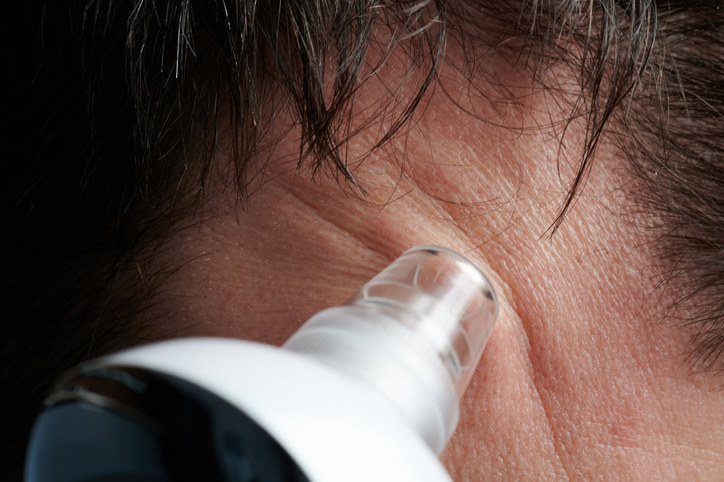
7. "What is the cause of jawline acne?"
Dr. Soma: Acne along the jawline is sometimes called hormonal acne. All acne has a hormonal component, but this can be a more prominent feature of those who get it in the jawline. It can be common, for example, in people with polycystic ovaries (PCOS).
8. "Why is the skin in my (shaved) armpits darker than the rest of my skin? And why is it bumpy textured?"
Dr. Soma: Your underarms have unique skin; they have sweat glands and hair follicles which contribute to this bumpy textured appearance. It is also very common to have a darker shade of skin there. This is because of skin friction, where the two components of your underarm come into contact, as well as micro inflammation from shaving and deodorant. Darker armpits are usually totally normal but in some cases can be a sign of underlying disease, such as diabetes. If it is very prominent, it can be helpful to have a doctor check them out.
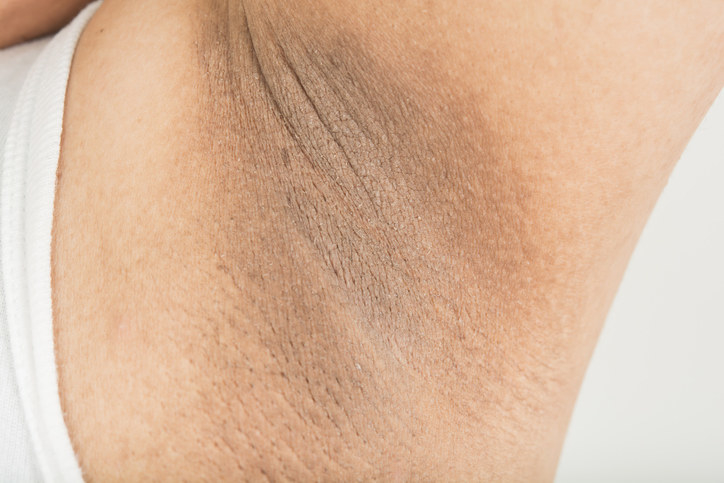
9. "I've had keratosis pilaris on my upper arms for as long as I can remember. It's more annoying than it is embarrassing. Is there really no way to get rid of it?"
Dr. Soma: Keratosis pilaris, also known as goosebump skin, is when keratin builds up in your hair follicles, causing little plugs. It is super common, and many people do grow out of it. There is nothing you can do to cure it, but to help minimize it, try body washes and moisturizers with urea or salicylic acid.
10. "What would be the best way to counteract hormonal acne caused by birth control — besides switching birth control?"
Dr. Soma: It sort of depends how extensive it is. The first thing to try would be a salicylic acid face wash or toner in the day and a prescription retinol at night. If you’ve tried the different skincare options, then a medicine called spironolactone can be very effective and can be used alongside the Pill.
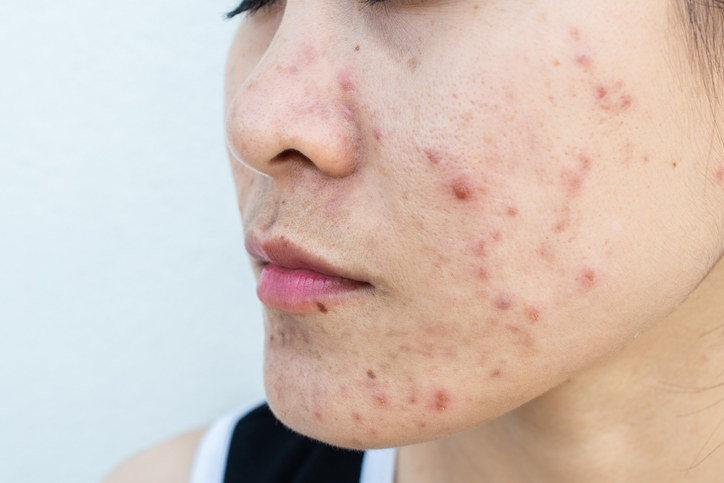
11. "I was recently diagnosed with alopecia areata. It started as one bald spot three years ago, but now there are bald spots everywhere. It has become impossible to cover up. I found a dermatologist who gave me my first steroid injections (my insurance doesn’t cover), but the bald spots seem to be getting bigger, and I have more of them. Any suggestions?"
Dr. Soma: I am so sorry to read about what you’re going through. Unfortunately, we don’t have a cure for alopecia areata, which is thought to be an autoimmune condition where the body attacks the hair follicles. Steroid creams, injections, or pills can sometimes help, and in a minority of people, so does Rogain. Certain dermatology centers have access to specialized medications or clinical trials, but as of yet, we do not have many very effective options. It can be a very traumatic process, so patient support groups can be extremely valuable (check out the National Alopecia Areata Foundation Support Group Network or, in the UK, Alopecia UK). There are also some good camouflage options if you want to give yourself a break from hats, such as hair fiber powders and sprays.
12. "How can I cover up the really dark places under my eyes? I also have a lot of very small patches of dried flaky skin that lotion doesn't help."
Dr. Soma: There are so many causes of dark circles: the shadows created by eye anatomy, thin skin and underlying veins, and genetics. The best treatment will really depend on each individual case, but some general tips are using an eye cream with caffeine and brightening ingredients during the day, sunscreen, and concealer. Regarding the flakiness, the area is prone to irritation and allergies, so it’s worth asking your doctor what could be causing it.

13. "When is a mole considered dangerous, or when does it need to get checked by a professional?"
Dr. Soma: My overriding motto is, “When in doubt, check it out.” Have you heard of the mole ABCDEs? It’s a quick and easy way that lets you know when you should have a mole checked out. Here’s a quick video that describes it.
14. "What’s a good over-the-counter eczema cream? I’ve tried everything from intense moisture creams to dry/itchy skin control shampoo and conditioner to relieve the itch on the back of my neck, and I’m almost certain it’s eczema."
Dr. Soma: It’s really important to get a diagnosis first. That’s a common place to get an allergic reaction, such as from haircare products. A dermatologist can do patch testing to see what you may be allergic to. Assuming it is dry eczematous skin, some good moisturizers include Aveeno Eczema Therapy, Aquaphor Healing Ointment, Vaseline Intensive, and CeraVe Moisturizing Cream.
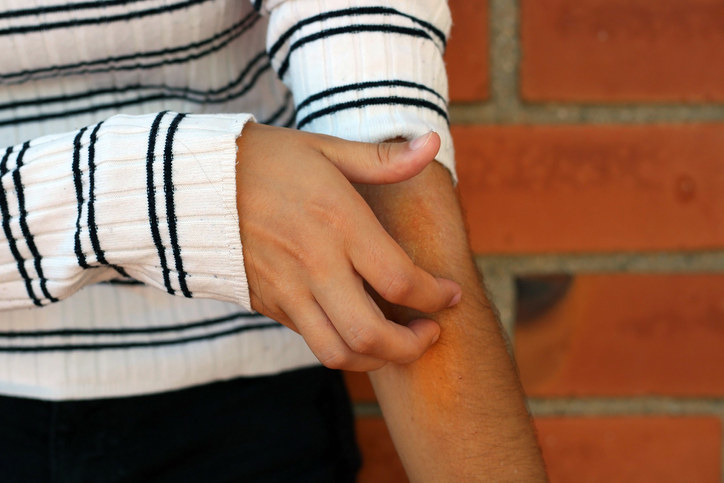
15. "I can’t afford better-quality products containing retinol. What’s the next-best antiaging ingredient I should look for in my skincare routine?"
Dr. Soma: There are some great affordable retinols out there that are about the same price as other antiaging ingredients, for example, the Ordinary Retinol range, Inkey List Retinol, CeraVe Skin Renewing Retinol Serum, and Differin Gel.
16. "What’s your opinion on microneedling and derma-rolling?"
Dr. Soma: Professional microneedling and derma-rolling is also called collagen induction therapy, which means it stimulates our bodies' production of collagen. There is scientific evidence it actually works, although the results are not super dramatic. HOWEVER — the home devices are a big no-no. First of all, to get results, those needles need to go deep. In professional settings, the face is numbed with a special cream. The home devices do not go deep enough to actually stimulate collagen. Secondly, the procedure needs to occur in a medically sanitized setting. You risk spreading an infection all over your face at home. Finally, a trained professional needs to assess whether your skin is suitable for it. Wrong technique and wrong patient can lead to scarring or hyperpigmentation.
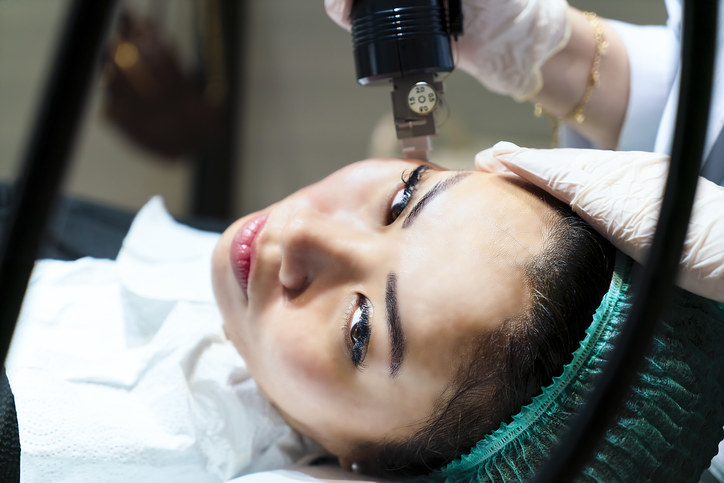
17. "I have skin tags all around my neck, and they painfully get snagged all the time. I want to know if there is a way to remove these at home or if I have to go to a doctor to get them removed. And if so, is it expensive?"
Dr. Soma: A dermatologist can remove these very quickly and easily, but the cost will vary.
18. "Is there any topical product that gets rid of fine lines, or is Botox truly the only option? I’m 28 and have some faint forehead and under-eye wrinkles, and I have been religiously using good-quality moisturizer, hyaluronic acid, vitamin C, and a retinol. I don’t have any problem with Botox if it’s truly the only real 'solve.'"
Dr. Soma: First of all, it sounds like you have a great skincare routine (I am hoping you just forgot to mention sunscreen, the number one preventer of wrinkles!). There is actually a pretty big body of evidence that shows retinol can help erase wrinkles. There are different strengths, and some are only available on prescription, but pretty much all of them work — it just takes patience.
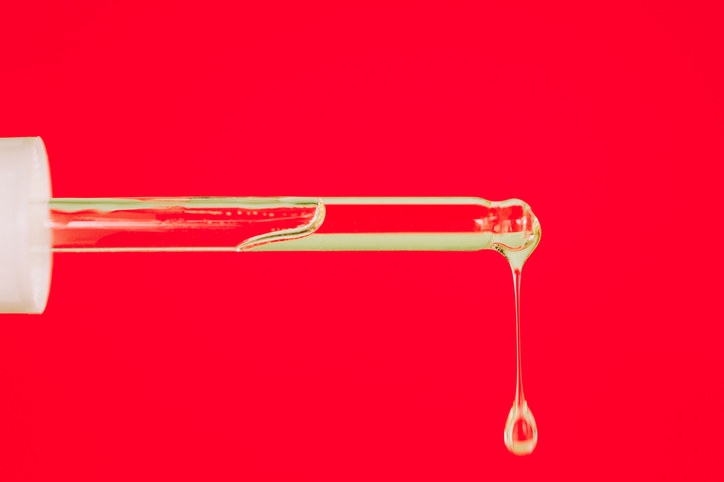
19. "Why do I get acne on my butt whenever I wear underwear? Just underwear, clean, properly washed, and new. I still develop weird pimples, and zits that grow and are painful if I touch them. If I don’t wear underwear, they go away."
Dr. Soma: The most common cause of inflamed pimples on your butt is actually folliculitis, which is inflammation of the small hair follicles. Heat and humidity are big factors, so wear breathable cotton underwear and change quickly if you’ve been working out. An antibacterial wash can be helpful, but make sure to keep it on for a minute or two before washing it off so it has time to act.
20. "How do I get rid of body acne? Like back and chest acne, to be more specific. I’ve been trying to get rid of it for years now and it won’t go away."
Dr. Soma: If you’ve been reading through my answers so far, you’ll see a pattern. When it comes to skin, we have lifestyle tips, “topical” options (things you apply to your skin), and medication options. The best lifestyle tips are making sure you are eating healthily, changing out of gym gear and showering, and getting to know your triggers. The best topical ingredients for acne are salicylic acid, benzoyl peroxide, and adapalene (aka Differin). If you have exhausted all of those, then you should discuss medications with your doctor. It is definitely something that can be improved!
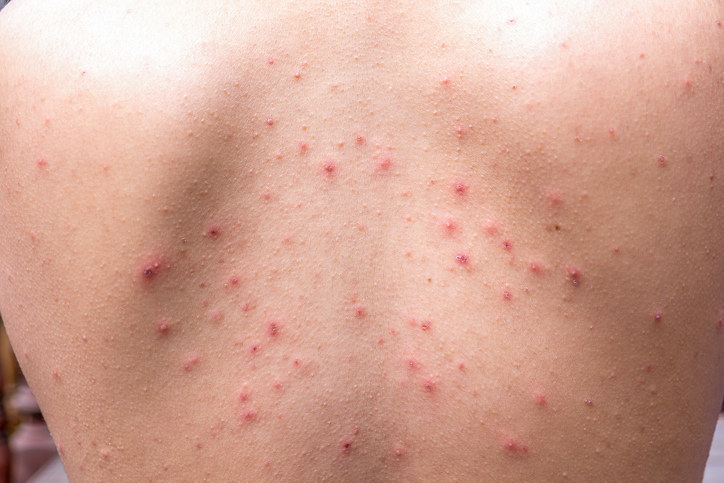
21. "I get rashes under my boobs (I’m extremely large-chested), and they hurt and itch. My boyfriend says it’s because air doesn’t get up there, but my friend told me it was a yeast infection. What causes them and how do I get rid of them?"
Dr. Soma: Both your boyfriend and your friend could be right. Under the breasts, the environment can be damp and warm, which yeast loves! But this area can be prone to eczema or psoriasis, even if you don’t have it anywhere else. The first step is to get a diagnosis; then the treatment advice can be tailored accordingly.
22. "What products help with hormonal cystic acne? Everything I’ve ever tried hasn’t helped. Retinol, glycolic acid, salicylic acid, benzoyl peroxide, lactic acid — nearly everything under the sun."
Dr. Soma: As you have figured out, cystic acne is the mother of all acnes and will not be tamed by skincare products. It usually requires medications: the Pill, spironolactone, or Accutane. It can leave scarring, which is much more difficult to treat than the acne itself, so the earlier you address it, the better!
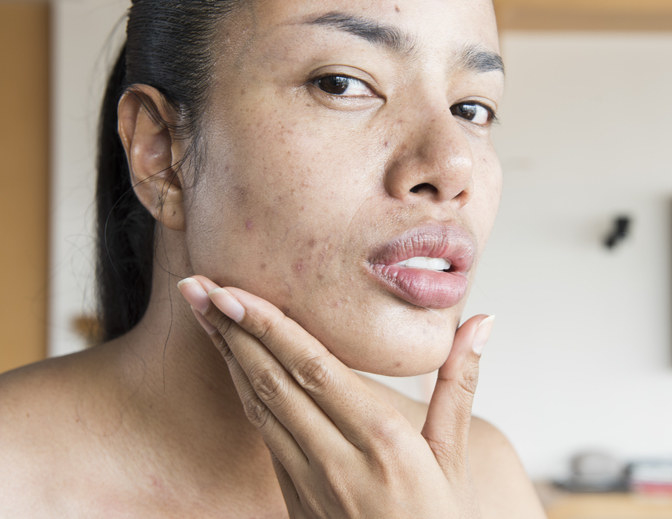
Want more content like this? Be sure to follow the BuzzFeed Community!
Note: Some responses have been edited for length and/or clarity.
